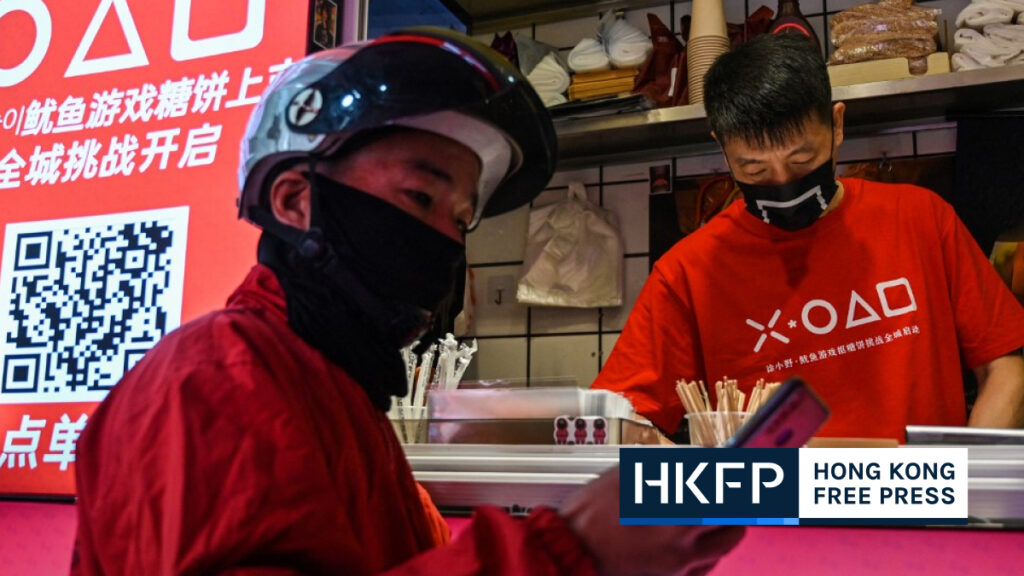Fraudsters Target Distressed Chinese Citizens with Deceptive Isolation Challenges and Debt Relief Schemes
READ MORE NEWS
Nippon Steel’s US Steel Takeover Plan Has Strong Support in U.S. Steelmaking Areas, Executive Says
From Academia to OnlyFans: Zara Dar’s Unconventional Career Shift
Stocks Rise in Europe After US Tech Rally Lifts Sentiment: A Market Overview
China Plans Record 3 Trillion Yuan Debt Issuance to Boost Economy Amid Challenges
Asian Markets Begin Holiday-Shortened Week With Mixed Results
New Era in Automotive: Honda and Nissan Formalize Merger Talks, Aiming for 2026 Union
China’s economy is struggling, and with it, vulnerable citizens are falling prey to a new wave of fraudulent schemes. In what can only be described as a dark twist on the hit South Korean TV show Squid Game, scammers are luring financially desperate individuals into deceptive “self-discipline” isolation challenges and fraudulent debt relief offers. Unlike the deadly stakes of the show, these Chinese “games” don’t involve life-threatening risks—but they come with serious financial consequences for those who fall victim.
As China’s economy slows to its weakest pace in over a year, fraudsters are capitalizing on the financial distress of ordinary citizens, promising cash prizes and debt restructuring that rarely materialize. The country is witnessing an increase in isolation challenges—where participants pay hundreds of dollars to stay in a room for several days, hoping to win large sums of money. However, as courts have found, these challenges are rigged, leaving players out of pocket and emotionally distressed.
“Squid Game”-Inspired Challenges Lead to Financial Losses for Desperate Players
These isolation challenges have surged in popularity as China’s economy faces turbulence. Advertised through social media platforms like Douyin (China’s version of TikTok), participants are drawn into these schemes with the hope of winning up to 1 million yuan ($140,000) by following a strict set of rules. The challenges require players to refrain from smoking, using electronic devices, consuming alcohol, and even having any outside contact. For many, it seems like a simple, if difficult, opportunity to turn their financial situation around.
One such case involves a participant named Sun, who signed up for a 30-day isolation challenge in hopes of winning 250,000 yuan. However, just three days into the game, Sun was disqualified after allegedly breaking the rules by covering his face with a pillow. This disqualification occurred despite Sun’s protest that the rules were arbitrary and unclear. The organizers, however, kept his registration fee, which amounted to hundreds of dollars, leaving him with nothing but frustration.
This type of manipulation is all too common in these isolation challenges. Many participants find themselves disqualified for minor infractions, often caught on surveillance cameras, leading them to lose their entry fees without receiving the promised rewards. While the financial losses may not be life-threatening, they are certainly devastating to those already in difficult financial circumstances.
Debt Relief Scams Prey on the Financially Strapped
Alongside the isolation challenges, another growing scam in China involves so-called “debt intermediaries.” These individuals or companies claim to help people restructure their debt, improve their credit ratings, or even secure new loans. However, these services come with high fees—sometimes as much as 12% of the loan amount—and offer little to no actual help. The National Financial Regulatory Administration (NFRA) has issued warnings to the public, cautioning them against falling for these debt restructuring schemes.
In some cases, intermediaries promise to help borrowers repair their credit records for a fee, but these services often come with the added risk of personal data being leaked or sold. The NFRA has warned that these fraudulent operations are exploiting China’s household debt crisis, which totaled 82.47 trillion yuan ($11.3 trillion) by November. With such vast amounts of personal debt, many individuals are desperate for a way out, making them easy targets for these fraudulent services.
Legal Action Offers Hope, but Scams Continue to Thrive
The Chinese government is starting to take action against these fraudulent practices. In a recent court ruling in Shandong province, an organizer of an isolation challenge was ordered to refund 5,400 yuan ($740) to a player who was wrongfully disqualified. The court determined that the contract was unfair and violated public order and good morals. While this ruling is a step in the right direction, many more victims remain in the lurch, unable to recover their losses.
The growing number of scams is a serious concern, especially as China’s economy struggles to regain momentum. In the three months leading up to September, the country’s economy grew at its slowest pace in over a year, which has led to increased financial stress for many households. Policymakers have pledged to implement measures to boost household incomes, but until these measures take effect, more and more people will likely fall prey to fraudulent schemes.

The Need for Stronger Consumer Protection
In light of these scams, stronger consumer protection is urgently needed. Regulatory bodies, such as the Cyberspace Administration of China, which oversees internet content, need to take a more active role in monitoring and controlling fraudulent ads and schemes on social media platforms like Douyin. The growing popularity of isolation challenges and debt relief scams underscores the need for better education and awareness campaigns to help the public recognize these dangerous schemes before they fall victim.
As China’s economic challenges continue, vulnerable citizens will likely remain at risk of falling into these fraudulent traps. Consumers must stay vigilant and cautious, especially when confronted with offers that seem too good to be true.
Conclusion: Stay Cautious Amid Financial Struggles
While China’s “Squid Game” frauds may not involve the life-or-death stakes of the popular TV show, they are still very real and devastating for those caught in the trap. With the country’s economy slowing and household debt soaring, vulnerable individuals continue to be targeted by fraudsters offering false promises of quick financial relief.
For those in need of help, it is important to approach such offers with caution. The best defense against these fraudulent schemes is awareness and education. As the country moves forward through an uncertain economic period, stronger consumer protections and stricter regulations will be crucial in preventing further exploitation of the financially vulnerable. Until then, the public must remain vigilant against the rise of these deceptive and harmful scams.









1 thought on “China’s “Squid Game” Fraud: Exploiting the Financially Vulnerable Amid Economic Crisis”